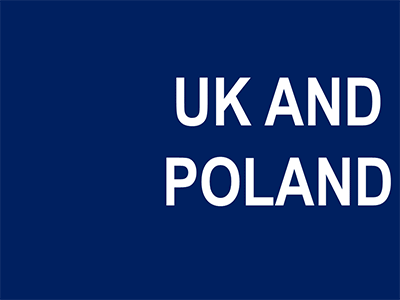10th July 2015 Dublin, Ireland
‘NATO: STRONG AND STEADFAST – A Guest Post by Gareth Chappell, Deputy Head of the Security & Political Team’

NATO: STRONG AND STEADFAST
As many of my FCO and MoD colleagues will promptly confirm, hosting a NATO Summit is a massive undertaking, presenting a wide range of diverse and complex challenges. For example, the last Summit in Wales involved 22 meetings in 29 hours plus 170 bilateral get-togethers; five dinners in four locations, two receptions and four family photos; and one flypast involving 22 planes.
When I ask my Polish colleagues how planning for next year’s Warsaw Summit is progressing, I am regularly reminded of the extraordinary scale of the Summit-staging challenge. Typically, a mixture of trepidation and exhilaration flits across their faces in reply. But Poland has a fine track record of delivering international events like EURO 2012 and I am certain that the Warsaw Summit will be no exception.
One year out from Warsaw and the North Atlantic Alliance faces a wide range of complex and diverse challenges of its own. You don’t have to read the news for very long these days before getting a sense of the scale of the task that confronts NATO. In recent weeks we have sadly witnessed barbaric acts of terrorism perpetrated against NATO populations both at home and abroad. At the same time, Russia continues to act with disregard for international law not far from here in neighbouring Ukraine. Our message to Russia remains constant: return Crimea to Ukraine.
In such an age of uncertainty, I am reminded just how important NATO is for our collective security and how we should not take the preservation of the Alliance for granted. If Europe is to remain whole and free, then NATO must remain strong and steadfast. Reinforcing this should be our top goal in Warsaw. As I see it, there are three ways we can collectively do this:
First, we must ensure that NATO remains ever ready. An Alliance that is out of touch with reality is defunct. Obsolete. NATO must implement in full and on schedule the adaptation measures agreed in Wales. At the same time, the Alliance must undertake further political, military, and institutional adaptation – while being realistic about resourcing – so that NATO is able to readily adapt and change to any challenge or threat that arises, from anywhere, at anytime.
Second, NATO must remain united. As the age old saying goes: ‘united we stand; divided we fall’. We face a number of tough choices on the road to Warsaw on a variety of issues, including assurance, adaptation, Russia handling, enlargement etc. When taking these decisions, our guiding principle must be Alliance unity and cohesion.
In my mind, standing united also means acting in solidarity. The UK is 100% committed to upholding the security of our Allies, including Poland. You just have to look at the scale of our commitment to NATO’s assurance and adaptation measures to see just how serious we are (e.g. Baltic Air Policing in 2014 and 2015, 3,000 troops on exercise along NATO’s Eastern flank in 2014 and 4,000 in 2015, leadership of NATO’s new Very High Readiness Joint Task Force in 2017 etc). Further, our commitment continues to grow. Just last month our Defence Secretary announced that the UK would recommit to the NATO Baltic Air Policing mission in 2016 and contribute a 1,000 personnel strong Battle Group to the Polish-led VJTF in 2020.
Third, it is my view that NATO must remain capable. Needless to say, an Alliance that is not properly resourced makes for easy pickings. The strategic landscape is loaded with a range of diverse and complex threats, stemming from a multitude of sources. I’ve already covered some of these above (i.e. a revisionist Russia, the growing and grave threat posed by ISIL etc). So it is imperative that Allies continue to invest in defence and build capabilities, while ensuring that NATO is flexible and responsive.
This burden can’t be borne by only a few (remember the NATO unity point?). Every Ally must shoulder their fair share. The UK is already doing this. The UK continues to spend more annually on defence than any other European Ally, and is one of only three Allies that currently meet NATO’s 2% and 20% defence spending targets. And on Wednesday this week, our Finance Minister announced that the UK would continue to meet NATO’s 2% target up until 2020, underscoring our global leadership on defence and security.
But 2% is just the tip of the iceberg. The UK is committed to investing £160 billion on new capability in the next decade, and to investing in a replacement to the UK nuclear deterrent too. These investments are not only aimed at protecting the UK, but also honouring our NATO commitments. We are also ready to use them when necessary. Right now nearly 4,000 British personnel are operating in 19 countries across the globe in addition to a permanent overseas military deployment of over 15,000.
NATO is the world’s pre-eminent political-military Alliance. The key to NATO continuing to proudly wear this badge is remaining strong and steadfast. We will be faced with many challenges on the road to Warsaw (including navigating the traffic for those of us who live here!). But the trick to tackling them will be plotting a course that keeps NATO ever ready, united and capable.
Poland has the privilege, and the challenge, of playing a key role in setting NATO’s direction, in Warsaw next year. Both as last year’s hosts, and as close Allies past and present, the UK will be there to support.
